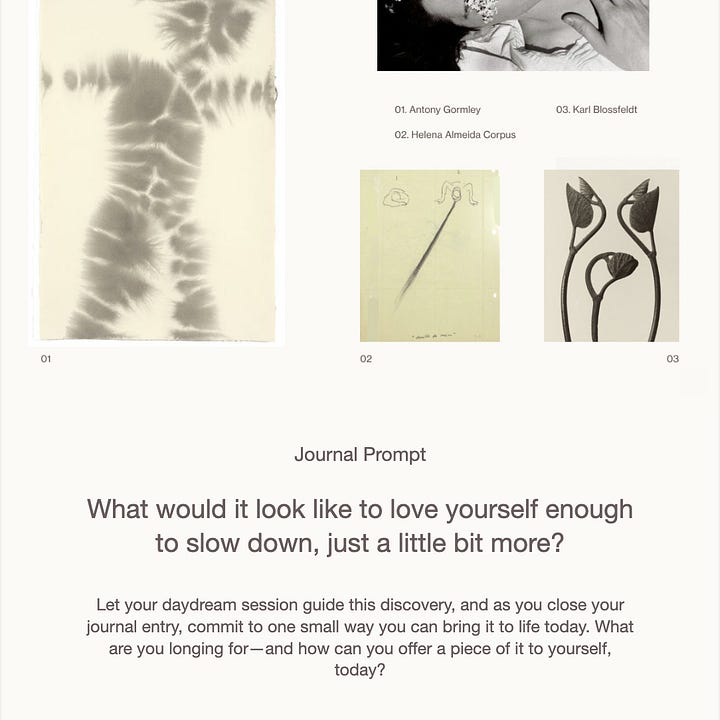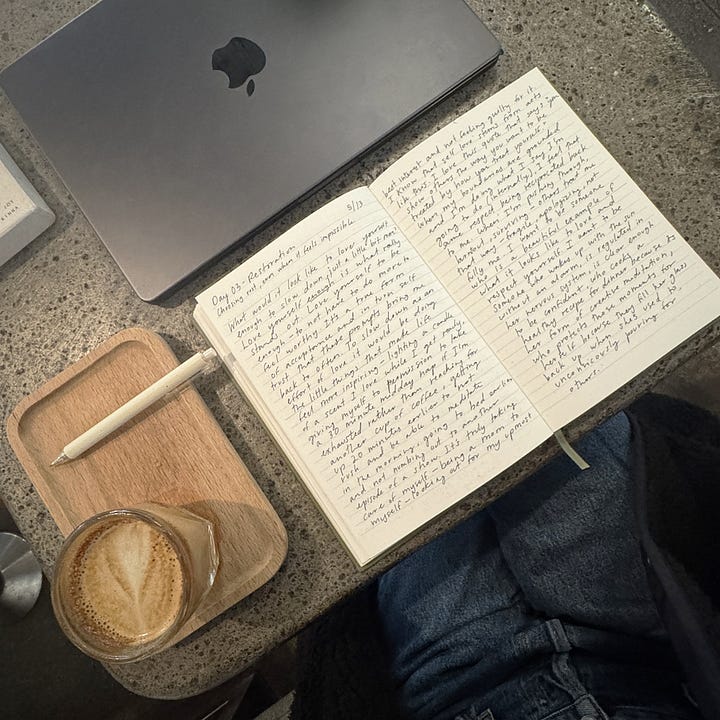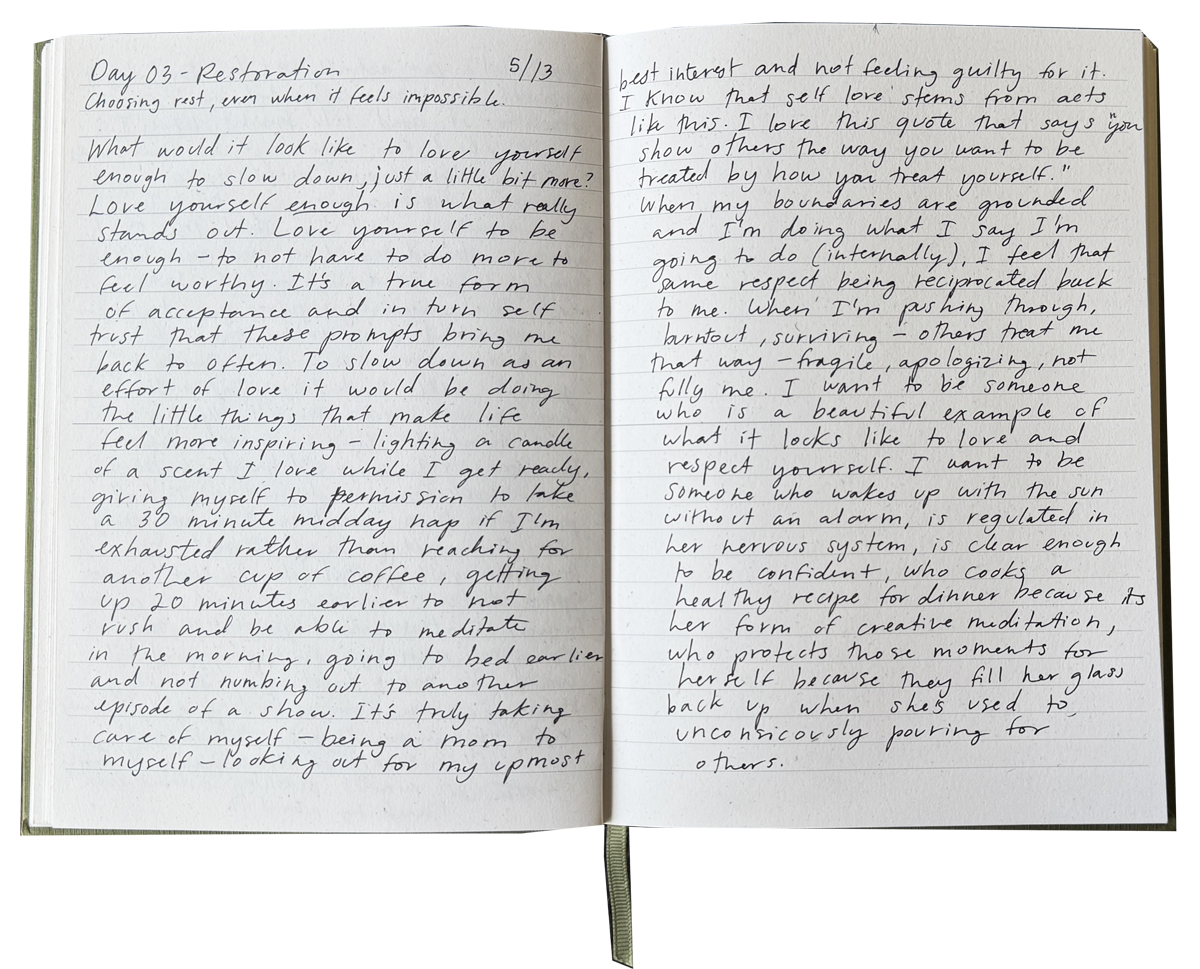Presence over performance
How choosing presence over performance builds trust within.
Day 03 of the Restoration course asks us to daydream — to get specific about what a slow day without a schedule would look like.
Not the highlight reel version, but the granular details — when you wake up, what you do first, the small moments you finally have space for because there’s time.
For me, it starts with sunlight pouring through the window to wake me up — no alarm, no rush. My phone is lost somewhere, but I feel no urgency to find it. I lay there with my eyes closed, warm and unbothered, completely in rhythm with myself.
I cuddle with my cat, Mochi, then we walk together to the kitchen. I make lemon ginger tea with honey. The house is quiet except for our shared footsteps and birdsong drifting in through a cracked window. The cool morning air moves through the room, and I breathe it in fully. I step outside and actually feel the sun on my skin — not just notice it’s sunny, but register its warmth in my body.
I journal before the world gets access to my thoughts. I let my mind settle into the day without interference. Then I make breakfast — eggs, toast, a smoothie. I wash my dishes — not because I have to, but because I’m not in a hurry. I enjoy the warm water on my hands, the simple satisfaction of a clean kitchen. The rest of the day follows that same pace.
And in this simple exercise, I noticed a few things:
My phone isn’t central. In fact, it’s nowhere to be found. While that’s not totally realistic in daily life, it’s a nudge — asking me where I can reestablish boundaries to protect my peace.
Without my phone, I lose track of time. Time has its grip on me more than anything else. When it’s no longer ruling my rhythm, my nervous system softens. I move slower. I feel more.
I’m feeling rather than performing. So often, we move through routines without really being in them. But when you take the performance out of your life and fill it with presence instead, even the most ordinary morning becomes a kind of restoration.
Here’s my response for Day 03 –
Prompt: What would it look like to love yourself enough to slow down, just a little bit more?
What stood out to me most in this entry is how clearly love was defined — not as something lofty, but as the act of slowing down just a little. Love, in this sense, looks like lighting a candle, letting myself nap instead of pushing through, choosing quiet over chaos. It’s giving myself permission to meet my needs without guilt — trusting that I know what’s best for me. And it’s in those repeated, conscious choices that self-trust is built.
This reflection reminded me that love isn’t just something I feel for myself — it’s something I practice through every small decision I make in favor of my well-being. The more I follow through with those tiny acts of care, the more I begin to believe I’m worth showing up for. That’s what makes self-love the root of self-trust — and why it’s so powerful.


Notes:
• Today’s course was written and curated by
, our inspiring collaborator for this journey into restoration. Her perspective feels like fresh air for a cluttered mind. I love the way she invites us to stop believing the lie that we “don’t have time,” when the truth is, all we have is time — and how we choose to use it.• The essay she linked from her archive is playful, imaginative, and so distinctly Emmie. It reframes rest as something available in the in-between moments — like her idea of leaving one minute earlier and walking slower while telling yourself, “I’m not in a rush.” That line really stuck with me. It’s in those small, stolen moments that we begin to win back our peace.
• From Emmie’s collection of classes that are included as a free trial alongside this course, I carved out time for Macchiato as a midday reset. I loved the way she describes the breath as the energy — and the slowness as the milk. That visual made something click for me. It helped me soften the parts of my day that usually feel dark and defined.
I love how Day 03 invites us to dream into the changes we crave, rather than criticize where we are. It shifts the focus from fixing to feeling — from judgment to gentle curiosity. What did today’s session surface for you? Comment below!



